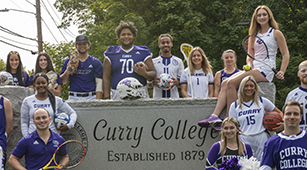Schedule an appointment to meet with Career & Experiential Learning about your area of interest.
Make an Appointment

Schedule an appointment to meet with Career & Experiential Learning about your area of interest.
Make an Appointment
Student-run clubs, organizations, and events are a key part of succeeding at Curry.

A Division III experience unlike any other. See what it means to be a Curry Colonel.

Empower our students to achieve their ambitions. Consider a gift to Curry College today.

Our rich liberal arts tradition, sound career focus, and empowering and supportive environment prepare our students for success.

As part of an effort to maintain an inclusive environment and foster community Curry College has a team of students, faculty & staff to respond to bias when it occurs on our campus, educate the community on what bias is and ways to prevent it, and provide support for our community members impacted by bias or hate incidents.
The Bias Incident Response Team (BIRT), which is chaired by Assistant Vice President for Student Engagement and Diversity, Jeannette Buntin, is an appointed and trained group of students, staff, and faculty members whose charge is:
Members of our Bias Incident Response Team are available to all members of our community if anyone wishes to seek support, advocacy, or information regarding identify-based harms.
To increase transparency and accountability in response to reports of bias, the College uses a Bias Incident Report Form. The Bias Incident Report Form provides students, staff, and faculty with a centralized reporting tool if they experience or witness an incident of bias on our campus.
The purpose of the Form is to address incidents that violate the College’s values and to identify any patterns of individual and structural behaviors where an institutional response may be necessary.
The Bias Incident Report Form can be completed anonymously or contact information can be provided if you would like a member of the BIRT to reach out to you. Reports are triaged to the appropriate department of the College based on the role of the person named in the report. This can include Public Safety, the Office of the Provost, Human Resources, Community Standards & Accountability, or other offices that the BIRT deems necessary to review.
Responses to reports of bias may range from informal resolution to formal disciplinary action, depending on the specifics of each incident.
Incidents when a person determines that they’ve been targeted and/or treated unfairly because of actual or perceived aspects of their identities or characteristics of those identities.
Including but not limited to, conduct/behavior, slurs, unequal or discriminatory treatment/service, graffiti, written messages, or images that harass or intimidate individuals or groups based on membership in protected classes and/or other marginalized/minority identities. It should also be noted that a bias incident or act can occur whether the act is intentional or unintentional.
In the Commonwealth of Massachusetts, a hate crime is defined as any act prohibited by law that is motivated because of the victim's race, color, religion, nationality, gender, sexual orientation or country of origin.
Each act of bias that is reported will be reviewed/judged; appropriate action steps taken on a case by case basis. As such it should be noted that not all acts of bias are going to require a response from BIRT.
It should also be noted that not all bias incidents will be found as hate crimes, while all hate crimes are (more severe) acts of bias.
Curry College students are encouraged to report bias when/if it occurs. We encourage students to report an act of bias even if they see it/or experience it as a bystander.
The college’s response to bias incident reports may vary depending upon factors such as, effect(s) on the campus community, the nature or severity of the report, whether the violator and the reporter has been identified, etc.
Curry College has established a Bias Reduction and Education Team (BRET). These teams will act as the college’s first response to bias/hate. All reported bias incidents will first go to the college’s INTERMEDIARY, who are also members of BIRT/BRET. The INTERMEDIARY will determine if in fact there was a bias incident and if so, share the report with the entire team (only in some cases). Should the INTERMEDIARY determine that there was not a bias incident a follow up email will be sent, and the Intermediary will request a meeting (if the reporter identified themselves). All reports will also be added to the college’s annual reports including, Title IX reports as appropriate. The bias team will meet when a report is shared by the Intermediary. The team will consider and carry out the most appropriate methods to address and respond to the incident. Some of the methods or actions taken by the team may include (but will not be limited to) the following:
Responding promptly to a possible act of bias/hate is important to the college. The following protocol provides an outline for potential actions when a bias incident is reported. The college will respond to reported acts of bias/hate as appropriate. Actions taken by the college will follow the process outlined below (unless circumstances call for other actions).
Submit Bias Incident Response Form Online (Goes to the INTERMEDIARIES)
The person reporting will receive a response and request to meet within two business days of receiving the report. If the report involves sexual misconduct—refer case to Human Resources to go through the Title IX process.
If the report is a clear violation of the Student Code of Conduct—refer case to the Office of Community Standards, Public Safety and AVP Student Engagement & Diversity) to go through the conduct process.
If Bias is NOT found-- reporter to meet with an INTERMEDIARY for discussion.
If Bias IS found, (and is a Student-Student case but does NOT involve conduct violations) moved along to the Response team for a meeting with reporter to determine all details and discuss next steps.
If Bias IS found, (and is a Student Reporting about a faculty or staff member but does NOT rise to level of college policy violations) the report is shared with the Office of Human Resources for consideration. The reporter will also be asked to meet with an INTERMEDIARY to determine all details and discuss options for next steps.
If Bias IS found, (and is a Student Reporting about a faculty or staff member and DOES involve a violation of college policy) the report and case is referred to the Office of Human Resources for processing.
If Bias IS found, (and is a FACULTY/STAFF Reporting about another faculty or staff member) case is referred to the Office of Human Resources as an employee issue.
If after all steps of this process are followed, and the person reporting is not satisfied with the process or the results, they can APPEAL decisions with the Vice President of Student Affairs.
Bias: A negative opinion or attitude toward a group of persons based on their race, gender, gender identity, religion, sexual orientation, ethnicity, national origin or (dis)ability.
Bias Incidents: Incidents when a person determines that they’ve been targeted and/or treated unfairly because of actual or perceived aspects of their identities or characteristics of those identities.
Including but not limited to, conduct/behavior, slurs, unequal or discriminatory treatment/service, graffiti, written messages, or images that harass or intimidate individuals or groups based on membership in protected classes and/or other marginalized/minority identities.
Discrimination: Any distinction, preference, advantage for or detriment to an individual compare to others that is based upon an individual’s actual or perceived sex, gender, race, color, age, creed, national or ethnic origin, physical or mental disability, veteran status, pregnancy status, religion or sexual orientation that is sufficiently serious that it interferes with or limits a student’s ability to participate in or benefit from the university’s educational program or activities.
Discriminatory Harassment: Detrimental action based on an individual’s’ actual or perceived sex, gender, race, color, age, creed, national or ethnic origin, physical or mental disability, veteran status, pregnancy status, religion or sexual orientation or other protected status that is unwelcome and unreasonably interferes with or limits a student’s ability to participate in or benefit from the university’s educational program or activities.
Harassment: verbal or physical conduct that has the effect of unreasonably interfering with an individual’s work or academic performance or creates an intimidating, hostile, or offensive working or educational environment. Harassment includes (as stated in the CURRY COLLEGE Employee Handbook) but is not limited to making negative comments about an individual or group of individuals with regard to race, color, religion, creed, gender, disability status, national origin, age and other protected classes.
Hate Crimes: (as written in the CURRY COLLEGE Student Handbook)
Intermediary: a person who acts as a link between people in order to try to bring about an agreement or reconciliation; a mediator.
Intimidation: implied threats or acts that cause an unreasonable fear of harm in another
Sexual Harassment: Gender based verbal or physical conduct that has the effect of unreasonably interfering with an individual’s work or academic performance or creates an intimidating, hostile, or offensive working or educational environment.
**We acknowledge that some will hold the belief that the system/mechanism by which we collect bias incident reports and the subsequent process, generates a tension with free speech and academic freedom. We assert that our bias incident policy/process was developed from a framework of inclusion; in order to provide spaces and opportunities where all members of our community balance the pursuit and engagement in vigorous intellectual rigor with a commitment to free speech, academic freedom and community building. This policy/protocol is a singular part of multiple campus resources/ services supporting the effort to maintain an inclusive environment and foster a community of scholarship. (ACUIM Spring ’22)










We use cookies to make interactions with our websites and services easy and meaningful. By continuing to use this website, you consent to Curry College’s usage of cookies and similar technologies in accordance with the college’s Cookie Notice.